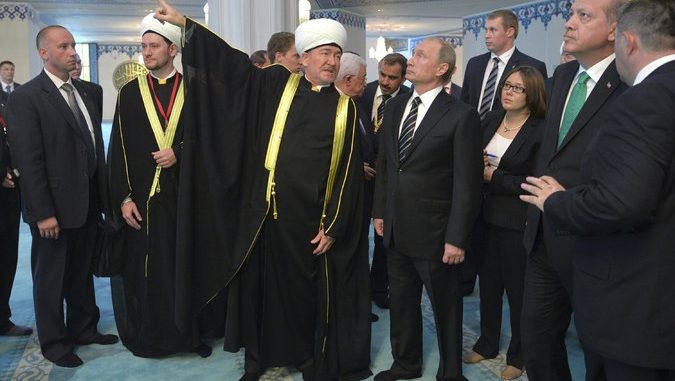
As ruler of a country with a large and politically active Muslim population, Putin avoids the term “radical Islamic terrorism” to emphasize the distinction from religion. In the US, by contrast, the relatively small Muslim population has shown almost no inclination towards violence or terrorism.
Vladimir V. Putin, Russia’s president, and President Trump, notably dismissive of political correctness,
would seem to have found common language on fighting terrorism —
except on one point of, well, language.
During his campaign, Trump associated Islam with terrorism and
criticized President Obama for declining to use the phrase “radical Islamic terrorism.”
However, Putin, whom Trump so openly admires for his toughness, has, for more than a decade, done exactly what President Obama did.
He has never described terrorists as “Islamic” and has repeatedly gone out of his way to denounce such language.
“I would prefer Islam not be mentioned in vain alongside terrorism,”
he said at a news conference in December, answering a question about the Islamic State,
a group he often refers to as “the so-called Islamic State,”
to emphasize a distinction with the Islamic religion.
And, this being Russia, the failure to adhere to this Kremlin-determined interpretation is a prosecutable offense:
Russian news media are required by law to note in any mention of the Islamic State that
the reference is to a banned terrorist organization of that name, lest it be misconstrued as denigrating religion.
Putin does not take this stance to soothe the feelings of Western liberals, a group he dismisses as hypocritical in any case.
“Putin prides himself on Russia’s intelligence capabilities,”
the Brookings Institution wrote in a study of the early formation of his counterterrorism policies.
“Russian leaders think they know their enemy,”
and it is not the governments of majority Muslim countries such as Iraq and Iran, or the majority of Muslims living in Russia.
Instead, Russian counterterrorism strategy focused on financing and militarily backing moderate Muslim leaders,
with the breakthrough in the Chechen war coming when the region’s imam, Akhmad Kadyrov, allied with the Russian military.
His son, Ramzan Kadyrov, leads the region today.
While embracing Islamic leaders as a centerpiece of its counterterrorism strategy, however,
the Kremlin did not avoid drawing distinctions along religious lines.
The Russian government backed the Kadyrov family’s campaign to revive traditional Sufi Islam in Chechnya
as a counterweight to the more austere [ and highly political ] Wahhabi approach professed by many separatists.
The Wahhabi strain was outlawed in another restive, predominantly Muslim province, Dagestan, and
its adherents are persecuted in Russia, rights groups say.
Still, the alliance with moderate Islamic religious leaders became important in pacifying Chechnya and other North Caucasus regions,
which have ceased to pose a serious security threat to Russia.
“Putin rules a multiconfessional country,”
Orkhan Dzhemal, a commentator on Islamic affairs, said in a telephone interview, noting that
in the United States, in contrast, Muslims are not a powerful political force.
“He cannot say ‘Islamic terrorism’ for a simple reason. He doesn’t want to alienate millions of Russians.”
The term preferred in Russian political parlance is “international terrorism.”
In a phone call on Friday, Trump and Putin discussed “real cooperation” in fighting terrorist groups in Syria.
They could agree on an enemy.
But the Kremlin statement described a “priority placed on uniting forces in the fight against the main threat — international terrorism.”
Source: The Phrase Putin Never Uses About Terrorism (and Trump Does) – The New York Times